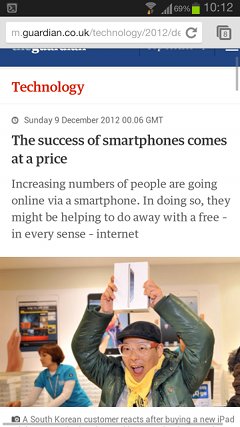"The success of smartphones comes at a price" errr, what?
I usually admire The Guardian's technology coverage (not least because they occasionally feature me!) but their latest article - The success of smartphones comes at a price - is ridiculously bad.  It posits three arguments.
It posits three arguments.
- More people are using smartphones to access the Internet than ever before.
- Smartphones are heavily locked down.
- Mobile Operators are "corporate control-freaks".
The author concludes that this is radically different from the PC world and, therefore, a very bad thing.
Hogwash!
Let's take those points in order.
Yes, more people are using smartphones to access the net. Five points to Hufflepuff.
The author assumes that smartphones are more heavily locked down than PCs. Nonsense.
Unless you, like me, are part of the small number of people who love installing Linux on every bit of kits you own - your laptop runs the same OS it shipped with. You buy a PC, you get Windows. You buy a Mac, you get OSX. Could you wipe the S and replace it? Theoretically - but people on the whole don't.
Apple and Microsoft do lock down their mobile ecosystem - and I think that's disgusting - but that ignores Android's free-for-all and the coming of new mobile OSes like Jolla and FirefoxOS.
Finally, Mobile Operators are "corporate control-freaks". I work for Telefonica (views are my own, etc) so naturally I disagree with this. The argument totally ignores that every smartphone on the planet can access WiFi. So if you can find a hotspot - you're out of the (somehow) evil clutches of the Mobile Operators and into the warm and loving embrace of the fixed line ISPs.
The same ISPs who are (mostly) owned by the same people as the mobile networks. And who wanted to track your every move with Phorm. And will happily block access to sites with no legal justification.
Conclusion
So, people are using their mobile to get net access. Their phones are - for all practical purposes - as locked down as their PCs. The mobile ISP they is use identical to their fixed line ISP.
Yes. I can see the terrible price we will pay if this disturbing trend continues.
What?
Would I like a phone which is as freely accessible as my Linux running PC? Yes. And I have that in Android. Would I like an ISP which didn't filter me at all? Yes, but all UK ISPs are control-freaks to a greater or lesser extent. Unless I can run my own cable to Linx, I'm stuck with the free market.
I really struggle to see what the author of this piece is saying.
Becky says:
hmm, an article sponsored by Apple?! 😉
Ha! Guardian are usually fairly even handed, but this one seems to have slipped through.
My Android smartphone won't let me share its internet connection with my Android tablet over bluetooth. The appropriate bits of the Settings area are missing. I assume I can thank Vodafone for this.
How annoying. Have you tried a different ROM?
Not yet. I've generally tried to steer clear of rooting phones, in the rather optimistic belief that they should meet my fairly basic requirements without that much effort 🙂
I suspect this optimism would be on a more solid footing if the networks would stop screwing with the firmware on phones.
We are moving to a more locked down, less open compute environment, and it isn't limited to mobile devices. Windows 8, with the limited metro API and Windows Store - which one can assume will become the main way to purchase software for Windows. And Apple, and the App Store for OSX.
By controlling what goes into these stores MS and Apple can 'guide' what types of applications and functionality are published and therefore used by the vast majority of their ecosystem participants.
The metro API is a reduced set of functionality, it isn't the same as the traditional desktop API and this limits the types of functionality applications can create and offer.
But Android isn't free and it isn't open. Its API has been reduced since the original version - reducing the functionality of applications. And the only way to really get an application on a device is to publish via Google Play.
It isn't free, device manufacturers have to pay Google for the right to have the complete software platform we regard as "Android". Without paying they only receive a subset of all the software necessary and are not allowed to state that the device is an Android device (Amazon Kindle Fire HD, etc.).
And yes, Google aren't as strict as Apple at the moment, but who's to say that will always be the case? As we've seen from Twitter, a companies view on what applications should run on their platform can change rapidly over time.
One of the reasons for the lock down is the commercial control it gives a company and the ecosystem that they've worked so hard to create.
While I'm looking forward to Firefox OS and other more open platforms, it remains to be seen if they will result in a sustainable alternative ecosystem. Fingers crossed.
While I can't say with any certainty that the Android API is getting more locked down, I think it's incorrect to say that you can only get Android apps via the app store.
Sites like Humble Bundle show that there is a vibrant market for side-loaded apps.